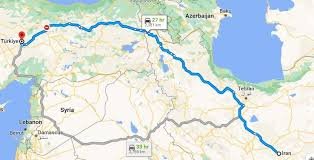Entering Turkey by Land: What You Need to Know

Entering Turkey by land is a popular and adventurous way to travel, whether you’re crossing from neighboring countries or exploring the country’s diverse landscapes. This article provides an in-depth guide to entering Turkey by land, covering the necessary documentation, border crossings, transportation options, and useful tips for a smooth journey.
The Basics of Entering Turkey by Land
When entering Turkey by land, travelers must adhere to certain regulations and procedures. The process can vary depending on the point of entry, nationality, and the specific border crossing. However, some general guidelines remain consistent for all travelers.
Firstly, you’ll need a valid passport. Citizens of many countries can enter Turkey visa-free for a limited time or with an e-Visa, while others may require a traditional visa. It’s essential to check the specific entry requirements for your nationality before starting your journey. Entering Turkey by land is straightforward if all documents are in order.
Key Border Crossings for Entering Turkey by Land
Turkey shares borders with eight countries, and each border crossing has its own rules and regulations for travelers. Popular land crossings include:
- From Greece: The land crossing between Turkey and Greece is one of the busiest. The most popular entry point is the Ipsala Border Gate, located near Edirne. Travelers coming from Greece can easily access Istanbul and other major Turkish cities from this crossing.
- From Bulgaria: Travelers can enter Turkey via the Kapitan Andreevo border gate, which connects Bulgaria with Turkey. This crossing is well-maintained and frequently used by tourists and local commuters alike.
- From Iran: For those entering from Iran, the Bazargan Border Gate is the main entry point. This crossing is popular among travelers heading to eastern Turkey, including Van and Istanbul.
- From Georgia: The Sarpi Border Gate is a prominent crossing for those traveling from Georgia to Turkey. It connects Batumi in Georgia to the Turkish town of Hopa, offering an easy entry into the northeastern part of the country.
These border crossings are well-facilitated for tourists and offer various transportation options, from buses to private vehicles, ensuring a smooth experience when entering Turkey by land.
Documentation Required for Entering Turkey by Land

One of the most important considerations when CHECK STATUS OF VISA is having the right documentation. Most travelers will need:
- A valid passport: Ensure your passport is valid for at least six months beyond your planned entry into Turkey. This requirement is standard for many nationalities.
- Visa or e-Visa: Depending on your nationality, you may need a visa. Many countries are eligible for an e-Visa, which is easy to obtain online. For travelers from countries not eligible for an e-Visa, a traditional visa can be obtained from Turkish consulates.
- Customs Declaration: When crossing the border, you may be required to declare any items that exceed duty-free allowances, such as alcohol, tobacco, or large amounts of currency.
The customs and immigration process when entering Turkey by land is relatively quick and efficient, but it’s advisable to allow extra time during peak travel seasons.
Transportation Options When Entering Turkey by Land
Once you have completed the necessary procedures, the next step is choosing your method of transportation. Entering Turkey by land offers multiple options, depending on your starting location and travel preferences:
- Private Car: For those who prefer flexibility and comfort, driving into Turkey by car is a great option. Roads are generally well-maintained, and Turkish highways are equipped with clear signs, making it easy to navigate. Just ensure your car meets Turkey’s road safety standards and that you have the necessary insurance coverage.
- Bus: Another common way of entering Turkey by land is by bus. Various international bus companies operate routes to major Turkish cities such as Istanbul, Ankara, and Antalya. This option is affordable and convenient, although the travel time can be long, especially for travelers coming from farther destinations.
- Train: For a more scenic and comfortable journey, trains provide a great way to travel into Turkey. The international train routes from countries like Bulgaria and Iran are a relaxed way to enjoy the landscapes as you head toward Turkey’s border.
- Taxi or Shared Ride: If you prefer a more personal touch, taxis or shared rides can be an option, especially from smaller border crossings. However, this can be more expensive compared to buses or trains.
Practical Tips for Entering Turkey by Land
When entering Turkey by land, it’s important to keep in mind several practical tips to ensure a seamless experience:
- Currency Exchange: It’s advisable to exchange some currency before reaching the border. The Turkish lira (TRY) is the official currency, but credit cards are widely accepted in urban areas. Exchange rates at border crossings might be less favorable, so plan accordingly.
- Border Crossing Times: Border crossings can be slower during holiday seasons or peak travel times. Be prepared for potential delays, especially during the summer months when Turkey sees an influx of tourists.
- Travel Insurance: Always ensure that you have travel insurance that covers your time in Turkey. While Turkey is a safe country, it’s always wise to be prepared for unexpected situations.
- Language: While Turkish is the official language, English is commonly spoken at major border crossings. However, it’s still helpful to learn a few basic Turkish phrases to ease communication.
Challenges You May Face When Entering Turkey by Land
While entering Turkey by land is generally a smooth process, travelers may face a few challenges:
- Long Waits at the Border: During peak seasons or on busy days, you may encounter long waiting times at border crossings. Be prepared for delays, and bring plenty of snacks, water, and entertainment.
- Customs Inspections: Customs officers at border crossings may carry out thorough inspections, especially if you are traveling with large amounts of goods. Be ready to declare anything you are bringing into the country.
- Road Conditions: While major highways in Turkey are well-maintained, rural roads can sometimes be less reliable. If you’re traveling by car, ensure that your vehicle is prepared for different road conditions.
Conclusion
Entering Turkey by land is an exciting and accessible way to explore the country, whether you are coming from neighboring countries or embarking on a longer adventure. By understanding the border crossings, required documentation, transportation options, and practical tips, you can make your journey as smooth as possible. With some preparation, entering Turkey by land can be an unforgettable experience, offering unique opportunities to experience the diverse landscapes and rich culture of Turkey.







